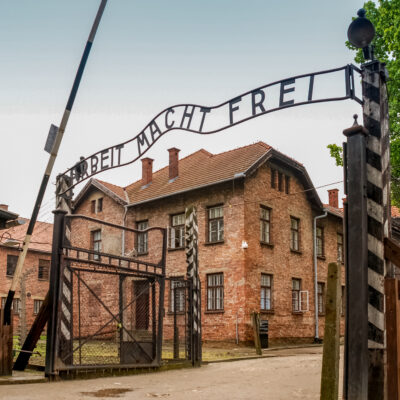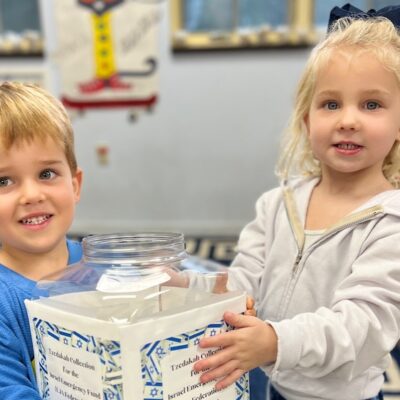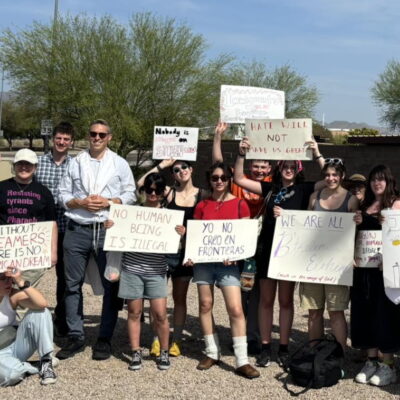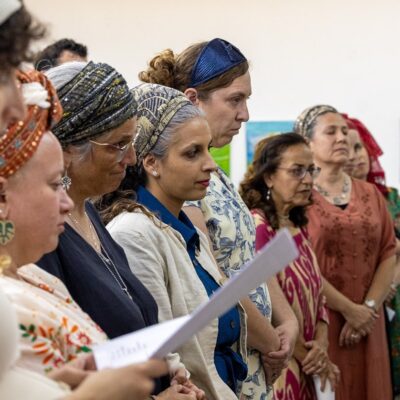first aid
UJA-Federation of N.Y. begins distributing emergency grants, sending millions to southern communities, nonprofits
Organization announces $22 million in funding but head of its Israel office says more is on the way

Leon Neal/Getty Images
Omer, a social work student, helps look after the children from Israeli families who have been forced to evacuate from their homes in the south of Israel due to the war with Hamas, at the Shemesh hostel in Beit Shemesh, Israel, on Oct. 16, 2023.
UJA-Federation of New York has begun distributing $22 million in emergency grants to Israeli nonprofits and initiatives in the wake of the Oct. 7 massacres and ensuing war, the organization announced on Monday.
This represents a major round of fund distribution, with grants being issued to a wide variety of organizations and causes, from mental health organizations to volunteering efforts and aid to Israelis directly affected by the war. Itzik Shmuli, the head of the federation’s Israel office, told eJewishPhilanthropy that these initial grants are only the beginning and that UJA-Federation of New York already plans to significantly increase the size of some of its grants.
“These grants cover the most pressing needs across affected communities including procuring new hospital equipment, mobilizing mental health counselors, providing cash grants for victims of terror, aiding thousands of displaced residents from southern Israel, and helping so many cope with displacement and grief,” Eric Goldstein, the federation’s CEO, said in a statement.
Roughly a third of the grants – $7.2 million worth — will go toward direct assistance to communities and residents of southern Israel, mainly to their local governments. Some regional councils of towns closest to the Gaza border who were hardest hit by last Saturday’s attacks will receive up to $700,000, while others will receive $300,000.
The rest of the grants are split between support for the organizations providing relief to the victims of the attacks, their families and to displaced Israelis. This includes: $2.025 million for psychological trauma organizations; $2.25 million for hospitals in southern Israel; $1.2 million for emergency response services; $2.1 million for groups organizing and mobilizing volunteers; $2 million for financial support for terror victims through the Jewish Agency for Israel; $1.1 million for support for soldiers; $1.6 million for charter flights to bring Israeli reservists and critical workers home; $1.2 million for residents of northern Israel; $970,000 for initiatives benefiting Arab and Bedouin Israelis; and $150,000 for organizations that help Holocaust survivors.
“In every place that the cursed terrorists tried to damage, we will be there,” Shmuli said. “UJA is here, and we are not going anywhere. We are strong enough — along with other philanthropic figures — to be here in this difficult time.”
Shmuli said the federation began preparing its relief response within hours of the terror attacks on Oct. 7.
“Eric got us together on Saturday night because it would be clear that UJA would be a significant actor,” he said. “He understood immediately that we — in every way — needed to move quickly, in terms of releasing public statements in support of Israel, in the fundraising efforts for Israel and in identifying the needs and finding where UJA could help.”
Shmuli told eJP that his message to local governments in the affected areas is: “We are here, whatever you need. I’m your first phone call.” This message to mayors and heads of local councils stands in contrast to the feeling that many of these local leaders have toward the national government, which they have criticized for a slow response to the crisis.
In the Knesset on Monday, Ashkelon Mayor Tomer Glam, whose city has faced countless barrages of rocket fire since last Saturday, fiercely criticized the government, specifically the Finance Ministry, for both not approving funding and for releasing approved funds slowly. Despite coming under regular attack, Ashkelon is not technically considered part of the Gaza periphery and is therefore denied national funding for bomb shelters, leaving many residents, particularly those from poorer and older parts of the city, without bomb shelters.
“What answers do you have for those people, who, apart from praying that they won’t be hurt, have nothing?” Glam shouted at Finance Minister Bezalel Smotrich.
Shmuli was reluctant to criticize the government but acknowledged that many of the federal funds were slow to reach people. “These are systems [in government] that are hard to start,” he said.
“The needs are immense, immense. The local authorities are taking on a lot more responsibility than they would by the book,” he said. “There are some who say it is unprecedented.”
Shmuli said the organization — both its office in Israel and its headquarters in New York – was working almost around the clock to identify the areas where people need help and assess how the federation can provide it.
“We are in constant contact with the significant organizations that are operating on the ground: hospitals, local authorities, volunteer groups, first responders,” he said. “We work with some 80 organizations, and the list is growing.”
In addition to coordinating with organizations on the ground in Israel, Shmuli said the federation was also in contact with other federations and major philanthropists in order to limit redundancies.
“We try to understand the scope of the need and to support that, but also to be coordinated with other philanthropies — we have three WhatsApp groups with federations and Israeli leaders — in order to plan the actions of everyone,” he said.
Shmuli, who said he personally knew several people murdered or wounded in the attacks, said the Oct. 7 massacres were the “most traumatic experience that Israel has ever had,” comparing them to the Holocaust.
Yet he said he was inspired by the level at which different parts of Israeli society and from the Diaspora were banding together to help one another and the country.
“So many groups that you wouldn’t have thought could work toward the same cause, are now working together, shoulder to shoulder,” he said. “And people are seeing the incredible support from the Diaspora and from U.S. Jewry and from foreign governments.”













